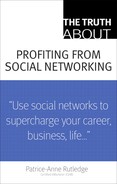Your social networking profile introduces you to the world. Not everyone is going to read your profile, and most who do won’t take action. The few communications that you do receive are generally positive or innocuous, such as job or business inquiries, greetings from old friends, introductions from likeminded people, or even connection requests from “name collectors” who just want to add you to their massive collection of online contacts.
But the truth is, you never really know who is reading your profile. Keeping this in mind, knowing that you’re prepared for the worst will help you make the most of your social networking experience. Most people run into relatively few problems during their time spent on social networking sites, particularly if they use common sense in what they post online.
But occasionally even a straightforward, professional profile can draw unwanted attention from a predator, scammer, spammer, or overeager “fan.” These problems span all demographics but, in general, children under 18, younger adult women, and very active social networkers (who encounter a higher volume of people) tend to be more prone to run into an occasional unpleasant situation.
If you’re a parent with children who participate on popular sites such as MySpace, you’re probably well aware of the potential dangers online and do what you can to protect your offspring from the online predators who’ve made headlines in recent years. But kids aren’t the only ones at risk, and online predators shouldn’t be your only concern.
As an adult social networker whose social networking goals are business- or career-related, you do have several distinct advantages in preparing yourself against unpleasant situations online: Your experience gives you the “street smarts” that kids haven’t developed yet, you’re probably networking on professional sites that have a lower incidence of problems, and you may be less likely to fit the target profile of a predator. On the downside, you may very well fit the target profile of a scammer looking for online profits.
In general, it’s fairly easy to avoid obvious predators and scammers. But sometimes what starts off as an innocuous situation catches you off guard and takes a turn in a different direction. Consider the following scenarios:
A recruiter contacts you through a social networking site and says that you’re nearly a perfect match for a job he’s trying to fill. The job and its high salary sound great to you, and you quickly dash off a copy of your latest resume. When the recruiter receives it, he emails you right away to say that his client loves your background and feels you’re a top contender for this lucrative job. The recruiter just needs your social security number to complete the client’s required paperwork and then will set up a formal interview for you.
You’re an author with a popular MySpace presence and encourage contact from readers to further develop your audience and increase sales. One particular reader starts sending you fan mail on a regular basis. At first, his communications seem innocent enough, but soon he begins to send you romantic poetry, asks you for detailed personal information, and indicates his desire to fly across the country to meet you in person because you’re the woman of his dreams.
You’re eager to hear from potential employers, so you include your email address in all your social networking profiles. Because you network primarily on business-oriented sites, you assume that your contact information is safe and won’t be shared with others. However, you soon start receiving an email newsletter that you didn’t sign up for. In addition, your volume of spam has greatly increased.
You receive a request to connect from a recent college graduate who would like to work at your company. Her academic credentials look good, so you accept her request and exchange a few emails in which you tell her she would be a great fit for a new position opening up. She sends you her resume and asks you to forward it to the appropriate hiring manager, which you do. Two weeks later, she sends you an angry email stating that she didn’t get the job she applied for and wants to know why. She then starts calling you at your office on a daily basis over the next few weeks.
No social networker wants to deal with an initially pleasant interaction that takes a decidedly unpleasant turn. In these cases, avoidance is the best practice. Follow your instincts in your interactions with the people you meet online. Treat your new online contacts just as you would any other strangers you meet, approaching with the restraint and caution that the situation requires. Few people are likely to scam or stalk you, but you should still trust your intuition if something just doesn’t seem right with an online contact, and stop communication before things move in the wrong direction.
Keep danger in perspective. Like the world itself, social networking sites are generally a safe place for those who make efforts to avoid bad situations. Be aware, but don’t let unfounded fears of danger lurking behind every email make you lose out on all there is to gain from social networking.
